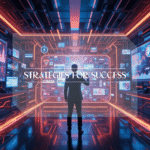Now Reading: AI-Driven Sales Growth Mastery: Forecasting, Scoring & CRM
-
01
AI-Driven Sales Growth Mastery: Forecasting, Scoring & CRM

AI-Driven Sales Growth Mastery: Forecasting, Scoring & CRM
Artificial Intelligence (AI) is transforming the sales landscape, reshaping traditional processes, and unlocking new opportunities for efficiency and precision. From predictive analytics to automated customer relationship management (CRM), AI is becoming an indispensable tool for sales professionals. Companies that embrace AI-powered solutions gain a competitive edge, making sales forecasting more accurate, lead scoring more strategic, and customer interactions more personalized. This article explores the role of AI in sales, the benefits of AI adoption, challenges in implementation, and strategies for leveraging AI to optimize sales performance.
Understanding AI in Sales
What is AI in Sales?
AI in sales refers to the use of machine learning algorithms and data-driven analytics to automate and enhance sales activities. AI tools can analyze vast amounts of data, identify trends, predict customer behavior, and streamline sales workflows.
Core Applications of AI in Sales:
- Sales Forecasting – Predict future sales performance based on historical data and real-time market trends.
- Lead Scoring – Rank leads based on engagement, demographics, and likelihood to convert.
- CRM Automation – Automate follow-ups, emails, and customer interactions to improve relationship management.
- Chatbots and Virtual Assistants – Engage prospects in real-time, answer queries, and schedule meetings.
- Predictive Analytics – Identify buying patterns and recommend next-best actions for sales reps.
Why Businesses Should Adopt AI in Sales
1. Enhanced Accuracy and Efficiency
AI processes large datasets quickly and efficiently, improving the accuracy of sales forecasts and market analysis.
2. Improved Lead Qualification
Traditional lead scoring often relies on manual inputs and intuition. AI-driven lead scoring uses data science to prioritize leads with a high probability of conversion.
3. Personalized Customer Engagement
AI-powered CRM tools analyze past interactions and customer behaviors to personalize communication, increasing the likelihood of closing deals.
4. Increased Productivity
By automating repetitive tasks such as data entry and follow-ups, AI allows sales professionals to focus on relationship-building and closing deals.
5. Competitive Advantage
Companies leveraging AI gain deeper customer insights, enabling them to create targeted sales strategies that outperform competitors relying on traditional methods.
AI-Powered Sales Processes
1. AI-Driven Sales Forecasting
Accurate sales forecasting is crucial for resource allocation and strategic planning. AI examines past sales data, customer behavior, and market conditions to provide predictive insights. Advanced forecasting models adapt to changing conditions in real-time, helping sales teams make data-driven decisions.
2. Intelligent Lead Scoring
AI enhances lead qualification by analyzing multiple data points such as website interactions, email engagement, and social media activity. AI tools assign lead scores based on historical data, enabling sales teams to prioritize high-potential leads.
3. AI-Enhanced CRM Systems
AI-powered CRMs streamline customer interactions, track communication across multiple channels, and provide personalized recommendations. Predictive analytics help sales teams identify when and how to reach out to prospects for maximum impact.
4. AI Chatbots and Virtual Assistants
AI-driven chatbots handle initial customer inquiries, book appointments, and guide prospects through the early stages of the sales funnel. These AI assistants provide 24/7 support, enhancing customer engagement and improving conversion rates.
5. Predictive Analytics for Sales Strategy
AI tools assess market trends, customer behaviors, and competitor strategies to optimize pricing models and promotional campaigns. Sales leaders can use these insights to refine their sales approach and maximize revenue.
Challenges of AI Implementation in Sales
Despite its advantages, integrating AI into sales operations comes with its challenges:
1. Data Quality and Integration
AI relies on high-quality data for accurate insights. Poor data quality or fragmented data sources can lead to unreliable predictions. Solution: Implement data cleaning and integration tools to maintain accuracy.
2. Resistance to Change
Sales teams may be skeptical about adopting AI, fearing job displacement or the complexity of new tools. Solution: Position AI as a tool that enhances, rather than replaces, human expertise. Provide adequate training and incentives for adoption.
3. Implementation Costs
AI-powered tools require investment in software, infrastructure, and employee training. Solution: Start with small-scale AI solutions such as automated lead scoring and gradually expand to more advanced applications.
How to Successfully Integrate AI in Sales
Step 1: Identify Key Areas for AI Integration
Assess which sales processes—forecasting, lead scoring, CRM, or customer engagement—would benefit most from AI-driven automation.
Step 2: Choose the Right AI Tools
Select AI solutions that align with your sales objectives. Popular tools include:
- Salesforce Einstein – AI-powered CRM and predictive analytics.
- HubSpot AI – Automated lead scoring and chatbots.
- InsideSales.com – AI-driven sales acceleration platform.
Step 3: Ensure Data Readiness
Clean and structure your data before implementing AI tools to ensure accurate analysis and predictions.
Step 4: Train Your Sales Team
Conduct AI training sessions to familiarize sales reps with AI functionalities and demonstrate how AI can enhance their productivity.
Step 5: Monitor and Optimize
Continuously measure AI performance, gather feedback from sales teams, and refine AI models to maximize their effectiveness.
Best Practices for AI-Enabled Sales Teams
1. Combine AI with Human Expertise
AI provides data-driven recommendations, but human intuition and relationship-building skills remain crucial for closing deals.
2. Keep AI Models Updated
Regularly update AI algorithms and retrain models using new data to ensure accurate predictions and insights.
3. Focus on Customer-Centric AI
Leverage AI to personalize sales interactions, providing tailored recommendations and customized engagement strategies.
4. Maintain Ethical AI Practices
Ensure AI tools are transparent, unbiased, and aligned with data privacy regulations to build trust with customers.
Conclusion
AI-driven sales tools are revolutionizing the way businesses engage with customers, forecast sales, and optimize lead generation. Companies that adopt AI gain unparalleled insights, improve efficiency, and drive higher revenue. However, successful AI implementation requires a strategic approach—ensuring data quality, training sales teams, and continuously refining AI-driven processes.
By integrating AI with human expertise, sales organizations can unlock new levels of performance and stay ahead in the ever-evolving sales landscape. The future of sales belongs to those who embrace AI-powered innovation and leverage it for smarter, more effective decision-making.












